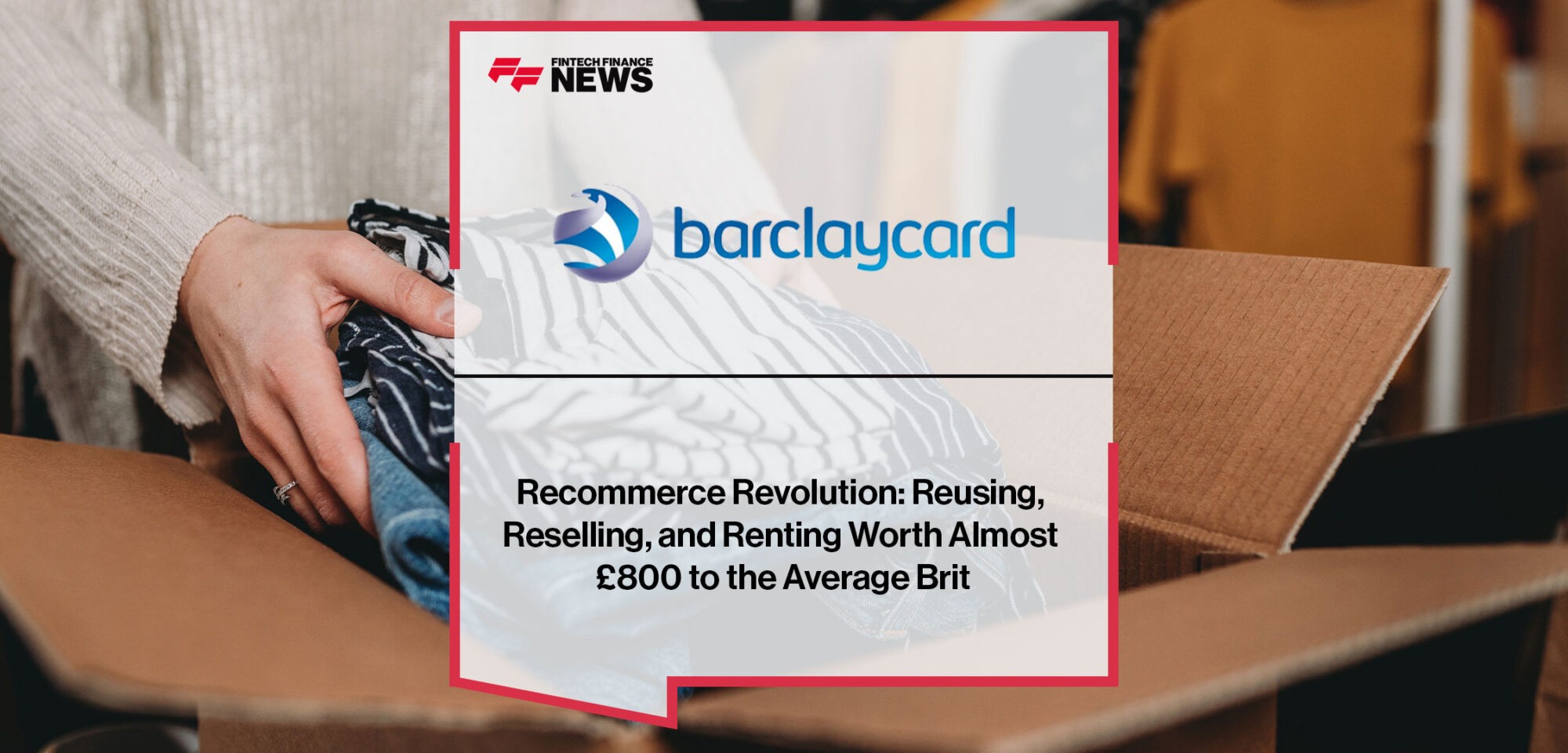Breaking News

Recommerce Revolution: Reusing, Reselling, and Renting Worth Almost £800 to the Average Brit
Recommerce1 – defined as buying, selling or renting previously owned products – continues to grow, as new figures reveal consumers are opting for second hand over new and hiring pre-loved items more often than they did 12 months ago, contributing £6.99 billion2 to the UK economy.
Barclaycard Payments, a leading payments provider, has partnered with economic impact analysts, Development Economics, to combine thousands of consumer responses with demographic data from the Office of National Statistics to calculate the value of the Recommerce Economy.
The analysis shows that the trend of shopping more sustainably has contributed £6.99 billion to the UK’s economy in the last year, with Brits spending just over £5.92 billion on second hand products and £1.07 billion on renting items to use for a set amount of time, rather than purchasing them new3.
Barclaycard Payments found that this behaviour is growing. Over four in 10 (44 per cent) buy more second hand items than they did a year ago, while a further 57 per cent say their Recommerce shopping behaviour has remained consistent, indicating this shift in the way we shop is here to stay.
The main motivator of change is the rising cost of living, with six in 10 consumers (62 per cent) saying this is causing them to think more carefully about the purchases they make – up 19 per cent year-on-year. The desire to adopt more sustainable shopping practices (43 per cent) as well as accessing items that would usually be financially out of reach (22 per cent), such as designer goods, are also key factors.
The research found that Brits make £25 a month on average from selling their unwanted processions on online marketplaces or in-person, such as at car boot or garage sales. In a sign that Recommerce is going full circle, almost a quarter (23 per cent) who resell items also use the funds to purchase second hand items for themselves in the same setting. Amidst the ongoing cost-of-living crunch, one in five (21 per cent) puts the additional income towards monthly bills and 15 per cent transfer it to a separate savings pot.
Fashion conscious Gen-Z leads the charge
Gen-Z adults (those aged 18-24) are particularly motivated by shopping second hand, viewing pre-loved items as ‘more fashionable’ (30 per cent) while also being attracted to clothes and accessories that their peers are less likely to own (31 per cent).
Younger millennials (aged 25-34) are the largest contributors to the overall Recommerce Economy, estimated to have spent £1.95 billion on second hand items in the past year and making up over a quarter of the total (28 per cent). Comparatively, those in the baby boomer generation (65-74 years) account for £602 million of spending (9 per cent).
Sector winners
By reviewing Recommerce shopping trends, Barclaycard Payments and Development Economics have calculated the five sectors contributing the most to the Recommerce Economy in last 12 months.
| Top Five Sectors | Percentage of Recommerce Economy | Value to Recommerce Economy |
| Cars and vehicles4 | 33.2% | £2.32 billion |
| Clothing and accessories | 17.3% | £1.22 billion |
| Entertainment and electronics | 16.0% | £1.16 billion |
| Home décor and houseware | 12.3% | £861 million |
| Baby care and the children’s market | 7.8% | £544 million |
Emerging rental markets
The research also revealed emerging sectors specifically within the rental sector, as one in 10 (10 per cent) now choose to hire items instead of buying brand new more frequently than they did a year ago.
Entertainment and electronics, which includes laptops, books, headphones and musical instruments, is the largest rental growth category contributing £209 million to the Recommerce Economy in the last 12 months. On average, consumers spent £50 on renting these items over the past year.
Home and garden items make up £190 million of the overall total, while pet care – such as crates, beds and toys – contribute £183 million, with Brits paying £52 on average to rent items in this category during the last a year. The sports and fitness sector, which includes sports gear and at-home gym equipment, contributes £170 million.
Make do and mend
The research also shows that half of Brits (50 per cent) are also turning to repairing their broken possessions in response to the rising cost of living. A further one in six (16 per cent) would get something fixed even if it would cost the same to buy it again new, suggesting the decision to avoid buying brand new is not only financial, but also influenced by a desire to be more sustainable.
Those that do try to repair their items are most likely to mend home and garden furnishings (59 per cent) or clothes and accessories (58 per cent). A third would attempt to fix entertainment items and electronics (34 per cent), while a quarter would attempt to fix children’s items (24 per cent) or sports equipment (24 per cent).
Linda Weston, Managing Director at Barclaycard Payments, said: “The rising cost-of-living and a shift towards more sustainable habits are changing the way Brits shop. Our data shows we’re increasingly opting to shop second hand, or rent items for a short period of time, rather than buying outright. The trend is permeating a range of sectors, from childcare to pet care and from fashion to fitness.
“This demonstrates an exciting opportunity for the UK economy, as well as retailers, with more than a third of Brits saying they plan to embrace more sustainable shopping practices in the years ahead. In order to capitalise on this trend, businesses should think about how they adapt to provide consumers with a range of more sustainable and affordable ways to shop in the future.”
Steve Lucas, Economic Development Manager at Development Economics, said: “UK consumers are increasingly recognising the value-for-money and sustainability benefits of renting or buying the items they need second hand. The Recommerce Economy is therefore already creating important economic influences across the UK, and these effects will continue to grow as more consumers recognise the benefits and extend their use of renting and second hand to a wider set of products.
“The market is supporting a significant number of retail sector jobs across the UK, and this proportion is set to show strong growth over the next few years.”
Harry Wallop, Retail Expert and Commentator, said: “Is it possible to shop more sustainably and save some money at the same time? It would seem the boom in the Recommerce Economy has come along at the just the right time for Britons hit by the rising cost-of-living but also keen to help the environment.
“This fascinating research sheds a light on how consumers are choosing to purchase second hand or rent items, over buying brand new. It also demonstrates the earning potential of taking part in the Recommerce Economy – with Brits making extra income in a difficult economic climate by giving unwanted items a second lease of life.”
People In This Post
Companies In This Post
- FinTech Australia Urges Government to Open Procurement Pipeline and Fix Funding Settings for Fintechs Read more
- TransUnion CIBIL and State Bank of India’s YONO App Collaborate to Integrate CIBIL Score and Report Into Everyday Digital Banking Read more
- Google on Building Secure Foundations for Fintech Growth Read more
- Tabadulat & Minted Connect Sign Strategic Collaboration to Enable Shariah-Compliant Gold-Backed Investments Read more
- TransferMate Completes Global Rollout of Vivox AI’s Next Generation KYB Automation Read more
















